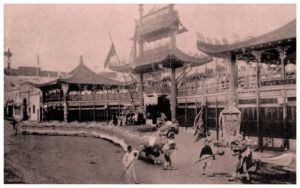Chinese Village: Difference between revisions
Public wiki for the 1904 Louisiana Purchase Exposition
(Created page with "{{short description|Roltairs Creation Diorama}} {{Infobox prepared food | name = Creation | image = China Village Main.jpg | image_size = 300px | caption = Main entrance of Creation | alternate_name = | country = | creator = | course = | cost = | admission = .25 ({{Inflation|US|.25|1904|fmt=eq}}) | profit = | owner = | main_ingredient = | variations...") |
No edit summary |
||
| Line 13: | Line 13: | ||
| profit = | | profit = | ||
| owner = | | owner = | ||
| main_ingredient = | | main_ingredient = | ||
| variations = | | variations = | ||
| calories = | | calories = | ||
Revision as of 19:53, 8 November 2022
 Main entrance of Creation | |
| Admission | .25 (equivalent to $8 in 2021) |
|---|---|
In the middle of The Pike was collection of buildings for the Chinese Village.
Etymology
Before the Fair
Description
The Chinese Village included a theater, restaurant, a tea house and a Joss house. Joss houses or (Miu), are a place for worshiping a variety of Chinese deities, saints and supernatural beings from Taoist, Buddhism, and Confucianism, principles to heroes and folklores. Upon entering an impressive portal, visitors could eat, partake in a wide array of arcade and games of skill (for small prizes, such as china, incense (called Joss sticks), etc. Theaters treated the guest to acrobatics, magicians and fire-eaters wanders the attraction entertaining the crowd. A bazaar, showcased Chinese artists weaving, carving and painting fine wares (available to the public).
